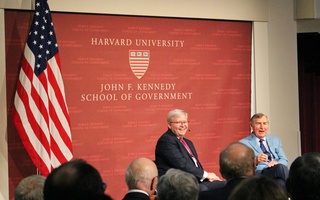{shortcode-840d758d53f729c026090fc587b0ae59c42ba09e}Historians and ambassadors debated the economic and political rise of China at the John F. Kennedy Jr. Forum Wednesday, drawing historical comparisons to great power conflicts from fifteenth century onwards.
Graham T. Allison Jr. ’62, a Kennedy School professor, spoke about a phenomenon he calls the "Thucydides Trap,” wherein a rising power like China frightens an existing power like the United States and sparks war. Allison was joined by former United States Ambassador to the United Nations Samantha J. Power and Hoover Institution senior fellow and former Harvard professor Niall C. Ferguson.
Allison’s book explores a number of important themes about great power conflicts, the current state of U.S.-China relations and Thucydides’s theory of great power conflicts.
“When a rising power threatens to displace a ruling power, alarm bells should sound, extreme danger ahead,” Allison said. “Thucydides said, famously, ‘It was the rise of Athens and the fear that this instilled in Sparta that made war inevitable.’”
The Belfer Center has developed the ‘Thucydides Trap” case file, analyzing 16 points in history when a rising power has threatened to displace a ruling power. In 12 of these cases, the conflict resulted in war.
According to Allison, Thucydides is also the founder of Realpolitik, often defined as a political philosophy based on practical rather than moral considerations. Allison proposed that the recent economic and political rise of China could challenge the United States and result in a conflict that would end the “long peace” since the end of World War II.
Allison argued that the potential for conflict between China and the U.S. would be the defining issue of our time. He challenged the audience to imagine new solutions grounded in history that would avoid a global conflict between major powers.
“This is going to be the challenge for the rest of our lives, and the question is will we follow business as usual? And if we do I think we’ll get history as usual,” Allison said. “Or can we imagine a surge of imagination, if we recognize a dangerous situation, a surge of imagination as remarkable as that which occurred as the US created a Cold War strategy for dealing with the Soviet surge, in which we had ‘war’ but not really a war like in the Thucydides Trap file.”
Ferguson analyzed the Trump administration’s attitude towards China, as well as U.S. multinationals’ intertwinement in Chinese markets and economic politics.
“Unlike our leaders, China’s leaders apply history,” Ferguson said. “There is no more historically minded leadership elite than [China’s].”
Ferguson pushed back against the assertion that China is the world’s preeminent power by contrasting Allison’s economic indicators with those that signify real power.
“It’s absolutely right that China is not number one, because those are not the most important measures from the vantage point of power… There is a sense in which even with Mr. Trump as president the US owns the international order, and plays a key role in international institutions, however much he may despise them,” Ferguson said. “I think we need to recognize that we are still quite some way away… from China being the preeminent power, especially in regard to military power.”
—Staff writer Lucas Ward can be reached at lucas.ward@thecrimson.com. Follow him on twitter at @LucaspfWard.
Read more in News
Month After Email Revelations, HCS Confident About SecurityRecommended Articles
-
Students Ask Input In K-School HiringLeaders of the Kennedy School's Student Association (KSSA) this week expressed dissatisfaction with the school's affirmative action record and urged
-
K-School Picks Recruiter To Get Women, MinoritiesFollowing the recommendations of two admissions officers, Kennedy School of Government officials this month reversed a previous decision and hired
-
Samantha Power Rejoins Team ObamaShe called Senator Hillary Clinton a “monster” last March, and it cost her her position in President-elect Barack Obama’s campaign.
-
Torture and the Harvard ManThe United States Senate recently produced a massive report assessing the merits of “enhanced interrogation”—America’s euphemism for torture—which sits classified and unpublished in a Capitol Hill vault.
-
 Former Asst. Defense Secretary Advises Path for U.S.-Chinese Relations
Former Asst. Defense Secretary Advises Path for U.S.-Chinese Relations













